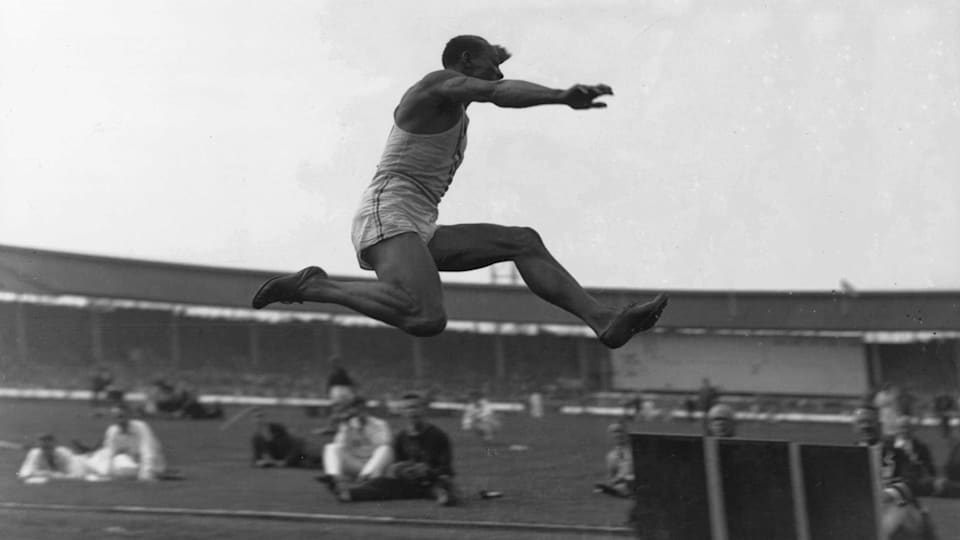Jesse Owens jumps for gold
Lodged between his 100m and 200m victories in the Berlin 1936 Olympic Games came the long jump, a competition during which Jesse Owens won something he came to value far more than his remarkable medal haul.

Jesse Owens, the man from Alabama, had a busy start to 4 August, his third consecutive day in Berlin’s Olympic Stadium. First up he glided through his opening 200m heat, setting a new Olympic record of 21.1 seconds. Almost immediately he was back in action, limbering up for the long jump qualifying competition.
With a leap of just 7.15m needed to qualify for the final, Owens was expected to ease through. A little more than 12 months previously, the then 21-year-old had jumped 8.13m, a world record mark that would stand for 25 years. But, perhaps fatigued by his efforts on the track or finally distracted by events off it, Owens came within centimetres of crashing out.
First, the USA athlete failed to notice officials raising their flags to signal the start of competition. As a result, his half-hearted run and hop into the sand, part of his warm-up routine, was, much to his disbelief, recorded as his first official jump.
Now undoubtedly perturbed, the normally unflappable American fouled on his second attempt. Just one jump remained for the heavy favourite to avoid elimination. Up stepped Luz Long, the European record holder. Tall, blond and blue-eyed, the German was Adolf Hitler’s dream Aryan athlete. But with remarkable grace, for which he would posthumously be awarded the Pierre de Coubertin award for sportsmanship, Long defied the prevailing mood engulfing his country’s high command and gave his African American foe invaluable advice.
He was my strongest rival yet it was he who advised me to adjust my run-up in the qualifying round and thereby helped me to win. Jesse Owens - Jesse Owens
The German, according to reports detailed by his son, urged Owens to move his take-off mark back well behind the board, reassuring him that he could jump 7.15m “in his sleep”. Owens followed Long’s advice and squeaked in to the final.
“He was my strongest rival yet it was he who advised me to adjust my run-up in the qualifying round and thereby helped me to win,” Owens said later in life.
The new friends dominated the final that evening, duelling dramatically in front of a capacity crowd.
Buoyed by his last-round escape from ignominy, Owens jumped 7.74m to lead after round one. Long matched it with his second effort, only for Owens to respond with a 7.87m. Neither man made a further impact until Long delighted his supporters in the stadium by matching his rival’s leading mark at the start of the fifth round.
You can melt down all the medals and cups I have and they wouldn't be a plating on the 24-carat friendship I felt for Luz Long at that moment. Jesse Owens - Jesse Owens
Having watched Long sportingly quieten the crowd before his fifth effort, Owens raced down the runway and soared out to 7.94m. Long failed with his sixth and final jump to improve on his best effort.
In a final show of brilliance, Owens breached the 8m mark, jumping 8.06m in the sixth round, an Olympic record. Japan’s Naoto Tajima claimed the bronze medal but it was all about the two leading men, a pair seemingly perfectly matched as enemies but in reality firm friends.
“What I remember most was the friendship I struck up with Luz Long,” Owens wrote long after the event.
“You can melt down all the medals and cups I have and they wouldn't be a plating on the 24-carat friendship I felt for Luz Long at that moment."
Owens and Long remained in touch after the 1936 Games, writing letters to each other until the Nazi invasion of Poland in 1939. Long died in 1943 during World War II but at the end of hostilities Owens picked up correspondence with his son, continuing a friendship that he held dear right up until his own death in 1980.
